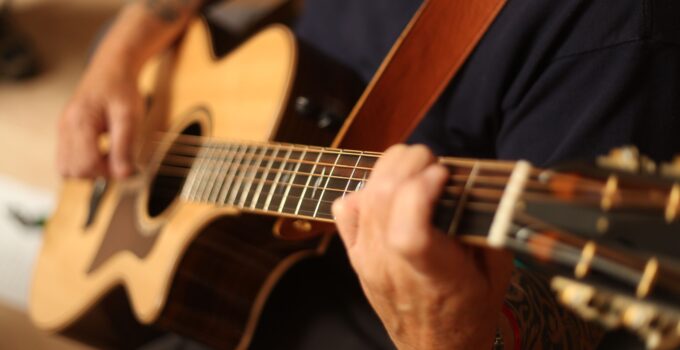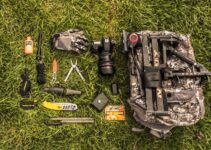Learning to play the guitar is a rewarding journey that many embark on, but one common question that arises is, “How long does it take to learn guitar?” The answer to this question isn’t straightforward as it depends on several factors. In this article, we’ll explore the various elements that influence the time it takes to become proficient at playing the guitar.
Learning to play the guitar is a journey that can be as short or as long as you make it. To understand how long it takes, it’s essential to set realistic expectations and consider various factors that influence your progress.
To learn how to play the B-flat guitar chord, head over to easy b flat guitar chord for a step-by-step guide and tips.
Page Contents
Setting Realistic Expectations
Recognizing that achieving proficiency as a guitarist is not an overnight accomplishment is essential. Realistic expectations serve as a crucial guide, safeguarding against the pitfalls of frustration and disappointment. It’s worth noting that the learning curve varies significantly among individuals. Factors like prior musical experience, dedication, and personal aptitude all contribute to the pace at which one progresses.
Embracing this diversity and staying patient with the process is instrumental in maintaining enthusiasm and achieving your musical aspirations. Remember, the journey of learning the guitar is as vital as the destination, and each step along the way contributes to your growth as a musician.
Choosing the Right Guitar
The selection of your guitar has a substantial impact on your learning journey. Acoustic, electric, and classical guitars each present distinct learning curves, with unique challenges and advantages. When making this choice, it’s essential to take your musical preferences into account.
For those drawn to the raw, unplugged sounds and portability, an acoustic guitar may be a suitable choice. Alternatively, electric guitars offer a wide range of tones and are often favored by those interested in rock or blues genres. Your choice should align with your musical aspirations, as it can significantly influence your engagement and progress as a guitarist.
Learning Goals and Styles
Crucial to your guitar learning journey is identifying your objectives and your favored playing style. Consider whether your goal is to strum chords for enjoyable sing-alongs, to master the art of playing intricate solos that captivate your audience, or to delve into the world of classical guitar with its timeless elegance.
The path you choose will be shaped by your objectives, as they dictate the specific techniques and skills you’ll need to focus on during your journey to becoming a skilled guitarist.
Finding a Good Teacher

Source: guitarchordsplayer.com
The presence of a proficient guitar teacher can significantly expedite your advancement as a musician. Their expertise allows for tailored instruction, pinpointing areas in your playing that require enhancement and crafting personalized strategies for improvement.
Moreover, their encouragement and support serve as an invaluable motivation, ensuring that you stay committed and enthusiastic about your guitar learning journey. Whether you’re a novice or an intermediate player, a skilled teacher can make a substantial difference in your progression, refining your skills and helping you reach your musical aspirations more efficiently.
Self-Learning vs. Structured Lessons
Choosing between self-directed learning and structured lessons is a critical decision in your guitar learning journey. Self-learners must possess self-discipline, as they are responsible for setting their own learning pace and goals.
On the other hand, structured lessons provide a more organized and guided approach, with a teacher or curriculum to keep you on track. It’s essential to evaluate your learning style and preferences to make the right choice for your guitar education.
Daily Practice

Source: chromaticdreamers.com
Consistency in practicing your guitar skills is paramount to achieving success. Dedicate a portion of your day to regular practice sessions, as this routine fosters steady progress. The more consistently you practice, the more rapid your learning will be. By nurturing a habit of daily practice, you enhance your skills, build muscle memory, and steadily advance as a guitarist.
Building Finger Strength and Dexterity
Building finger strength and dexterity stands as a crucial component of becoming a skilled guitarist. Engaging in targeted exercises tailored to enhance these skills is essential. These exercises are designed to fortify your fingers, enabling you to navigate the fretboard more deftly and execute complex chord transitions and intricate solos with precision and ease.
Chord Progressions and Strumming Patterns
A fundamental aspect of guitar learning is mastering diverse chord progressions and strumming patterns. This proficiency opens the door to playing an extensive repertoire of songs across various genres. It also significantly elevates your overall musicianship by developing your ability to adapt to different rhythms and melodies. This versatility empowers you to express your musicality and connect with your audience on a deeper level.
Learning Music Theory
Acquiring a grasp of music theory holds immense advantages for every musician. It serves as a foundational knowledge that facilitates reading sheet music, enabling you to interpret and perform a wide range of compositions accurately.
Furthermore, it empowers you to create and compose your music, lending your music a unique and personal touch. Understanding music theory also enhances your improvisational skills, allowing you to express yourself freely and creatively during your guitar performances.
Familiarizing Yourself with the Fretboard
Achieving mastery over the guitar fretboard represents a significant accomplishment in your musical journey. This skill empowers you to navigate the fretboard with ease and precision, enabling you to play with confidence and musicality.
As you become intimately familiar with the fretboard’s layout, you’ll effortlessly find and execute chords, scales, and melodies. This fluency not only enriches your playing but also boosts your overall performance confidence, allowing you to connect with your audience more profoundly.
Ear Training
Cultivating your musical ear is of paramount importance in your guitar learning journey. It equips you with the ability to discern chords, melodies, and progressions by ear, enriching your musicianship and transforming you into a versatile guitarist. This heightened sensitivity to sound empowers you to play with greater expression and creativity, enhancing your overall performance.
Playing with Others

Source: en.wikipedia.org
Engaging in musical collaborations with other musicians can significantly enhance your sense of timing and flexibility in adapting to various playing styles. Through these collaborative experiences, you’ll gain a deeper understanding of musical synergy and expand your repertoire, ultimately becoming a more versatile and skilled guitarist.
Recording and Analyzing Your Progress
Utilizing recordings of your practice sessions is a valuable tool for monitoring your advancement. When you listen to these recordings, you can pinpoint specific areas in your playing that require refinement. This feedback loop created by recording and self-assessment empowers you to continually enhance your guitar skills and reach your musical goals.
Staying Motivated
Sustaining motivation during your guitar learning journey is crucial. Encourage yourself by engaging with fellow musicians, establishing attainable objectives, and acknowledging your accomplishments along the way. This ongoing encouragement is essential for staying on course and continuing to progress in your guitar skills.
Conclusion
The time it takes to learn the guitar varies from person to person and depends on various factors. Setting realistic expectations, consistent practice, and a passion for music are the keys to success. Remember that the journey of learning the guitar is as important as the destination.





